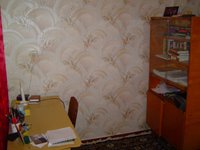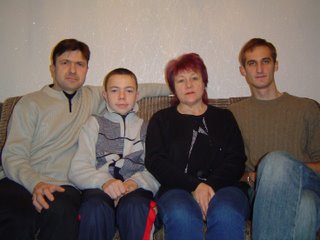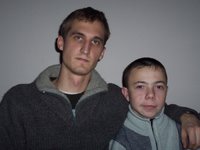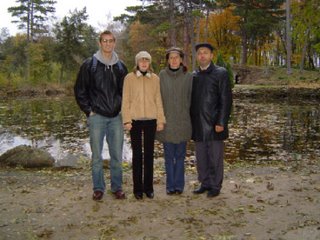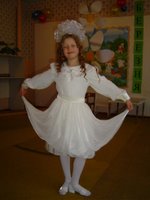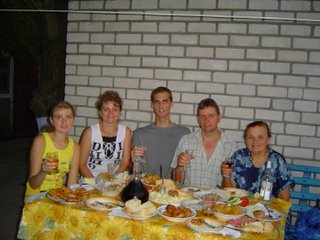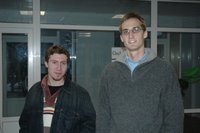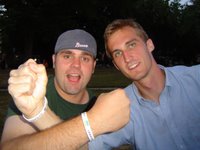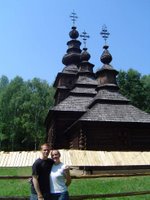 (as well as the above article about me), offers several explanations. Three attribute the name to the twoFrench counts who were the first proprietors of the land that would become the village. Perhaps their name was something like "Lepetykha." Or it could come from the word "lepetaty," which means to babble or prattle, as in "what are those Frenchmen babbling on about over there?" The supposed French origins are supported by the "Le" beginning, which may come from the French definite article; maybe the counts called the area "Le (something-or-other)," which the locals heard as "Lepetykha." The fourth explanation comes from an anecdote about Catherine the Great. Passing the area as she was sailing down the Dnipro, she is said to have described it as "lepo" (an old Russian
(as well as the above article about me), offers several explanations. Three attribute the name to the twoFrench counts who were the first proprietors of the land that would become the village. Perhaps their name was something like "Lepetykha." Or it could come from the word "lepetaty," which means to babble or prattle, as in "what are those Frenchmen babbling on about over there?" The supposed French origins are supported by the "Le" beginning, which may come from the French definite article; maybe the counts called the area "Le (something-or-other)," which the locals heard as "Lepetykha." The fourth explanation comes from an anecdote about Catherine the Great. Passing the area as she was sailing down the Dnipro, she is said to have described it as "lepo" (an old Russian  word meaning beautiful) and "tikho" (quiet). Perhaps the most likely explanation comes from a command given to rowers on boats that were trying to pass stealthily through unfriendly territory: "lyapay tykho," meaning "paddle quietly." So nobody is really sure where the name comes from, but when pressed for a short answer I usually give the last explanation. I like the idea of living in "Big Paddle Quietly."
word meaning beautiful) and "tikho" (quiet). Perhaps the most likely explanation comes from a command given to rowers on boats that were trying to pass stealthily through unfriendly territory: "lyapay tykho," meaning "paddle quietly." So nobody is really sure where the name comes from, but when pressed for a short answer I usually give the last explanation. I like the idea of living in "Big Paddle Quietly."Big Paddle Quietly is in the south-central part of Ukraine in the Kherson region directly to the north of Crimea. The weather here is allegedly warmer than most other parts of the country, although after last winter I believe that must have been a cruel joke. The region is almost entirely steppe, which is great for farmers, but doesn't provide particularly riveting scenery (and I used to live in Iowa). Agriculture is the main industry, with some shipbuilding and other maritime ventures near the city of Kherson, where the Dnipro meets the Black Sea.

Ironically, Big Paddle Quietly is tiny. I put it in the bottom tenth percentile of volunteer sites with regard to population. In some ways this is good (quaint charm, intimacy, fresh air), in other ways it's not (lack of resources, difficulty of transportation, the gossip factor). Good and bad, I've adjusted to life here and I manage to enjoy it most days, a fact I attribute more to the people than the village.
The village slopes downhill toward the Dnipro, the main river of Ukraine, which provides wonderful
 scenery. When I leave my apartment, if it's not too foggy, I can look down the hill 150 yards and see it. People bathe in the river during the summer. I didn't make it last summer, but it's on my list of things to do next summer. The buildings around here are also nice to look at. They make more adventurous color choices here, opting for bright yellows, lavenders, and other colors I don't see in the states too often. The residential areas mostly conform to a powder-blue color scheme. Deteriorated exteriors and overgrown foliage give the village an ancient, woodsy feel.
scenery. When I leave my apartment, if it's not too foggy, I can look down the hill 150 yards and see it. People bathe in the river during the summer. I didn't make it last summer, but it's on my list of things to do next summer. The buildings around here are also nice to look at. They make more adventurous color choices here, opting for bright yellows, lavenders, and other colors I don't see in the states too often. The residential areas mostly conform to a powder-blue color scheme. Deteriorated exteriors and overgrown foliage give the village an ancient, woodsy feel.
Lenin used to stand in every village and city center, although as you move west he has been replaced with other Ukrainian icons, most often the nationalist poet Taras Shevchenko (who I might add has a killer moustache that puts Lenin's goatee to shame). Velyka Lepetykha still has their Lenin, but for the most part he is ignored.
The riverside district is scenic, but a but depressing. Before the economic crisis of the 1990s, when people still had money, passenger liners used to float down the river, offering passage to Crimea, Odessa, and ports abroad, like Istanbul. The now defunct ticket office for these
 routes that no longer run is a sad spectacle loaded with symbolism.
routes that no longer run is a sad spectacle loaded with symbolism.Another symbolic edifice-- and my favorite-- is the unfinished church. It fell into disrepair during communist times, and now it's being refurbished with a new paint job and some shiny new golden domes. The repairs are headed by a priest from western Ukraine fixed up a church in a neighboring village in the same fashion (I went to this church last Easter and met this priest-- the church is amazing, the priest a wonder as well). When I lived with the Dyakovs, I walked by this
 church on the way to and from school. I started to write a poem about it in Ukrainian for publication in our Peace Corps newsletter, but like the church itself, it is still being worked on.
church on the way to and from school. I started to write a poem about it in Ukrainian for publication in our Peace Corps newsletter, but like the church itself, it is still being worked on.The village of Velyka Lepetykha has its own website(!)
There are some good pics on the site. Good luck navigating it if you don't speak Russian.
This is a robot bear. If you can name what book this is from, I'll give you a dollar.








